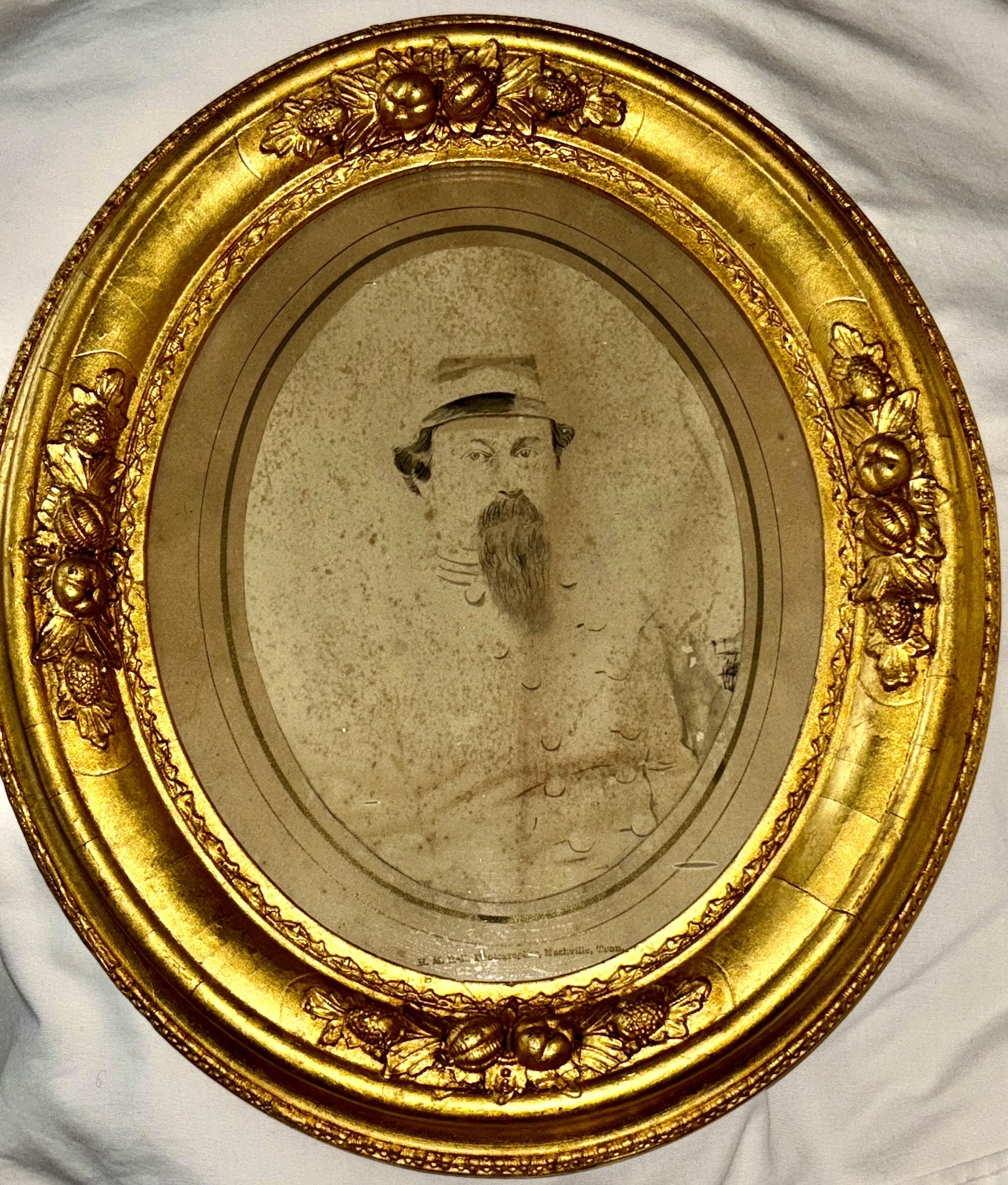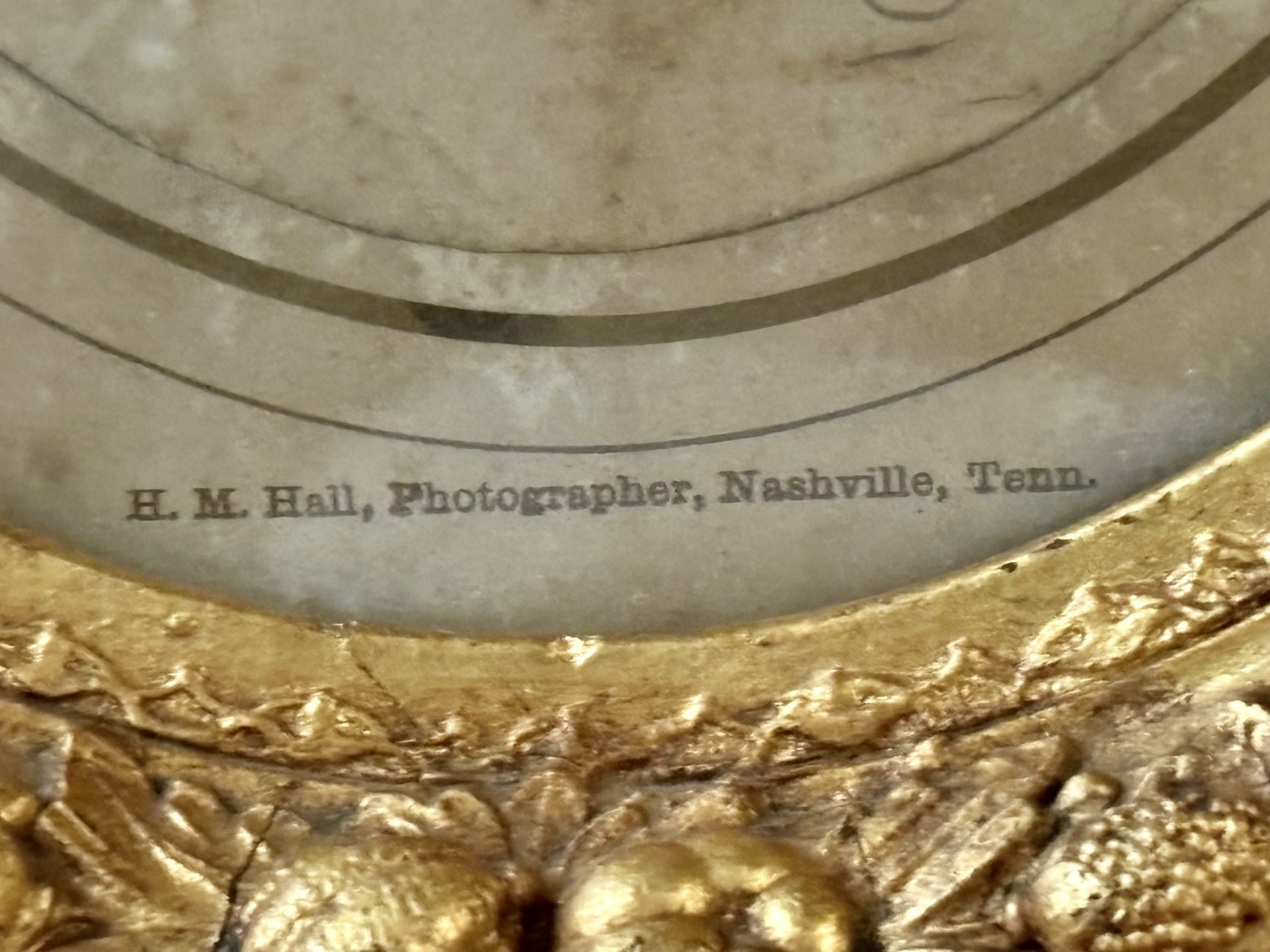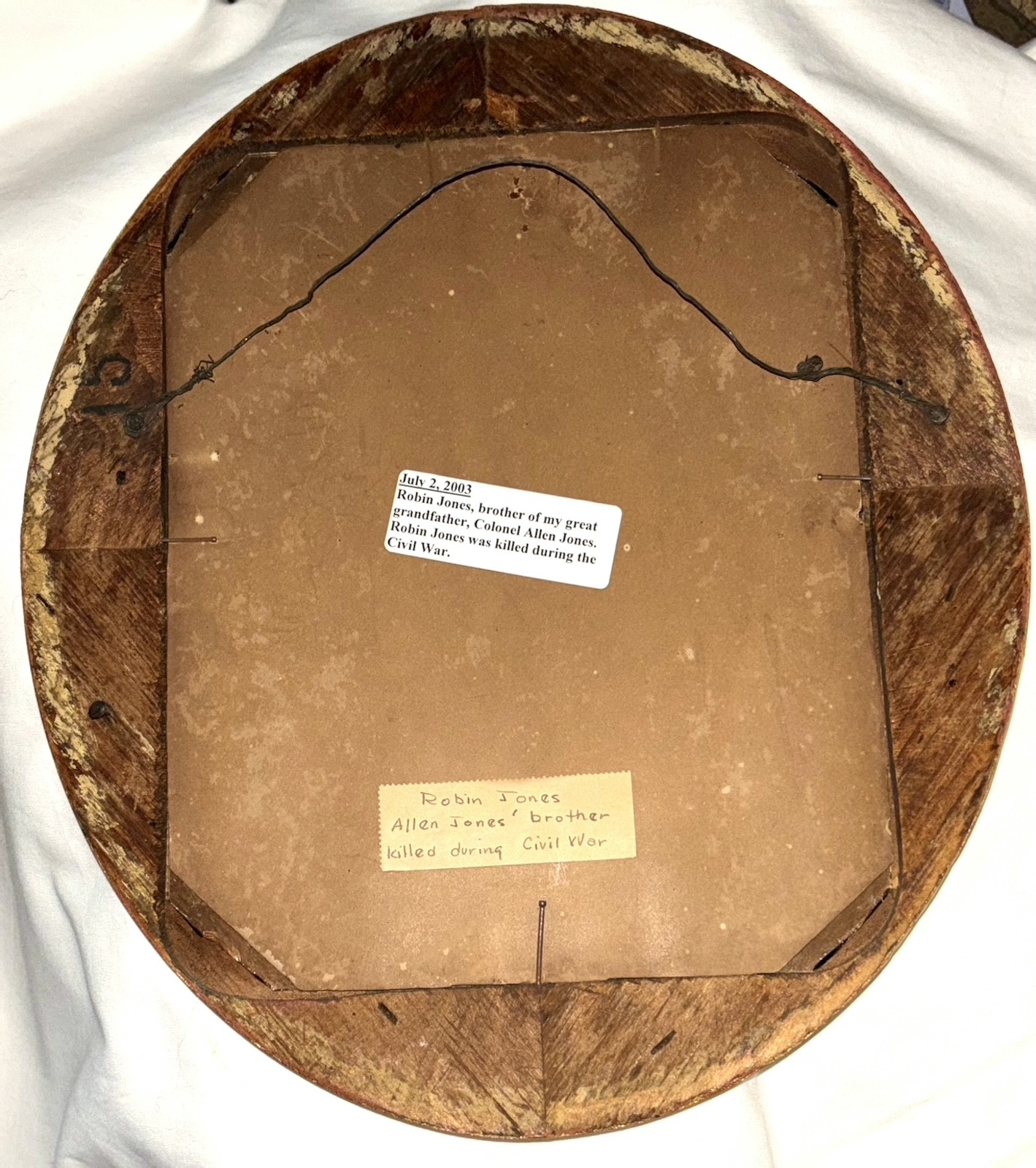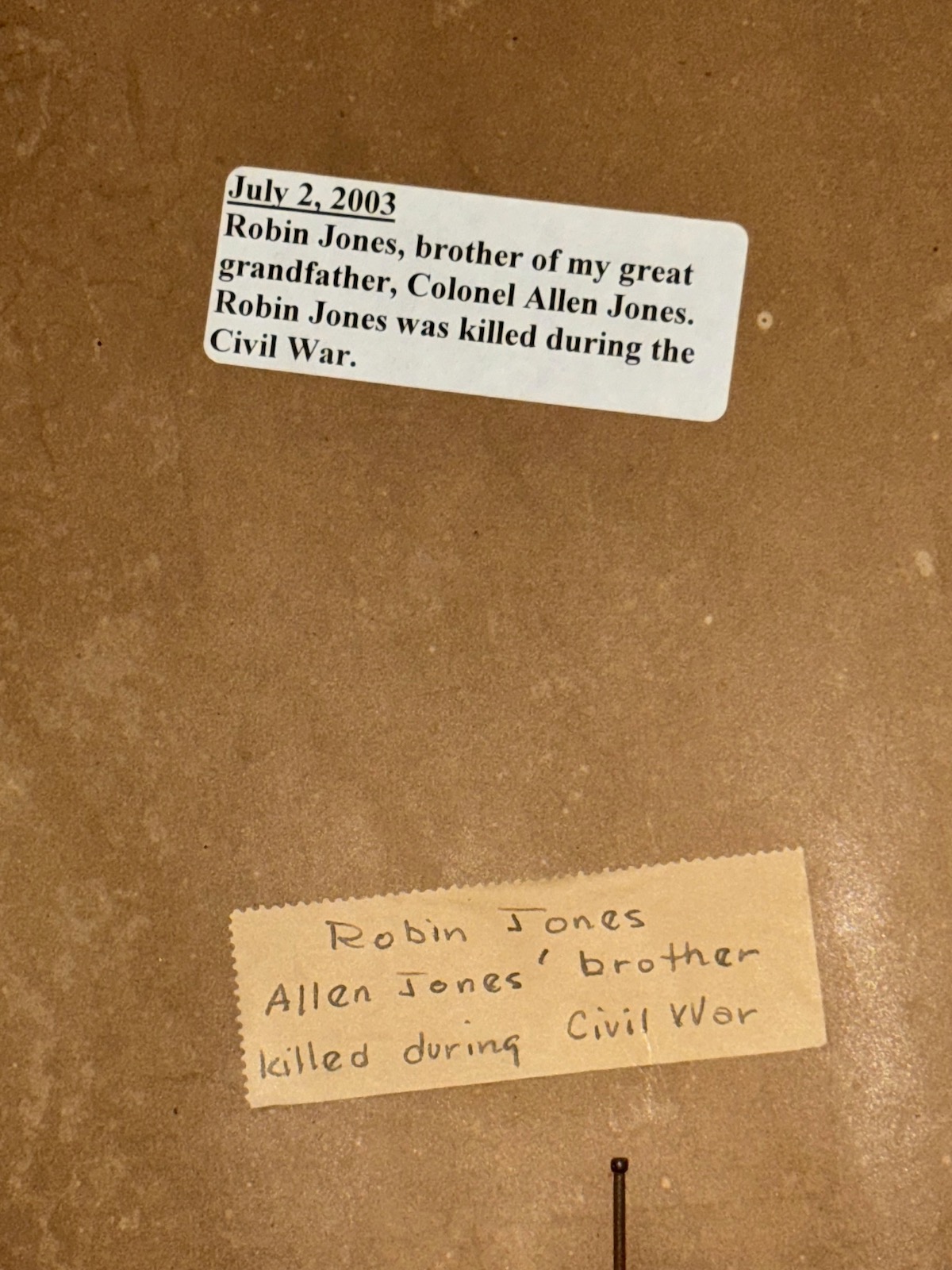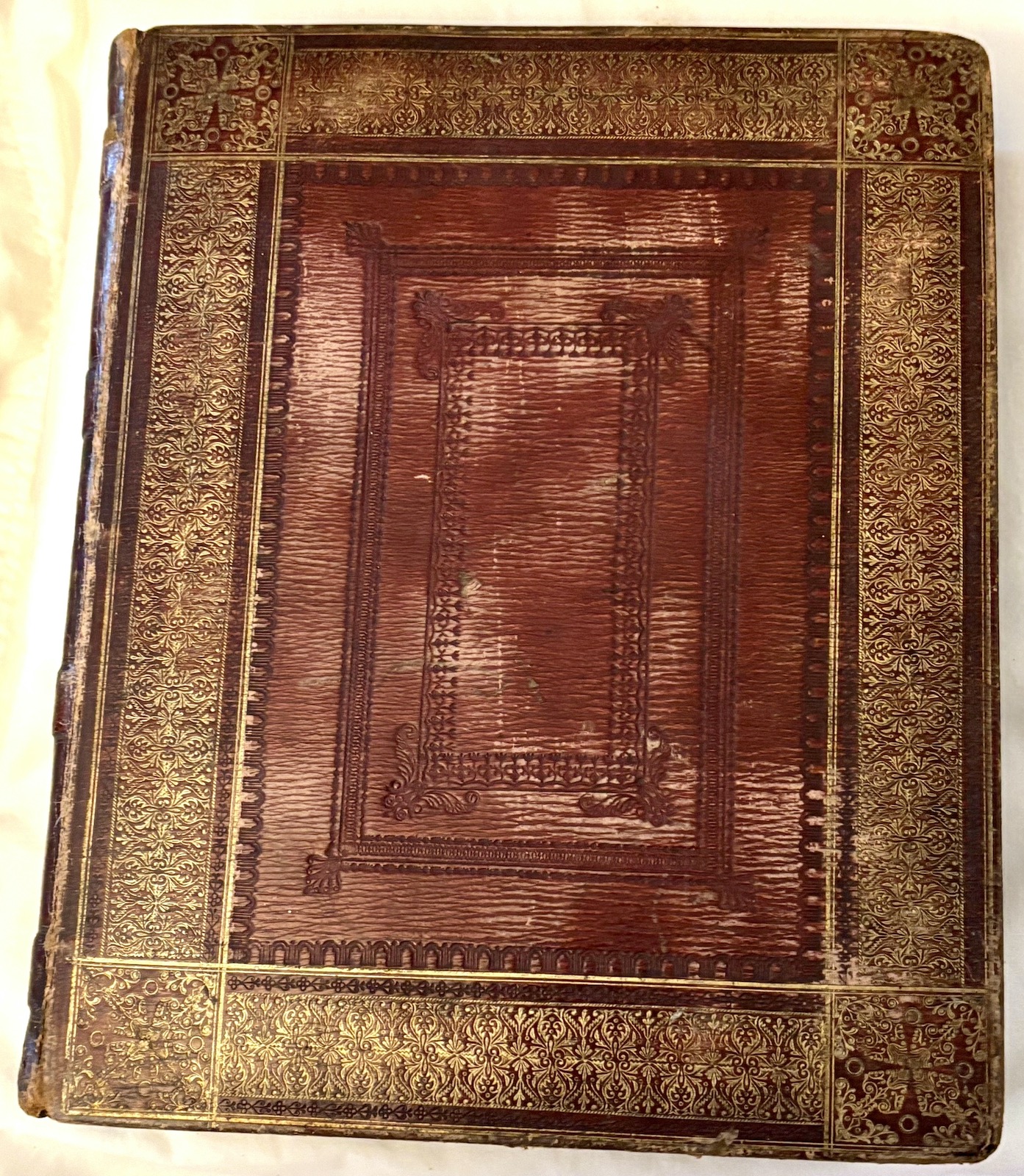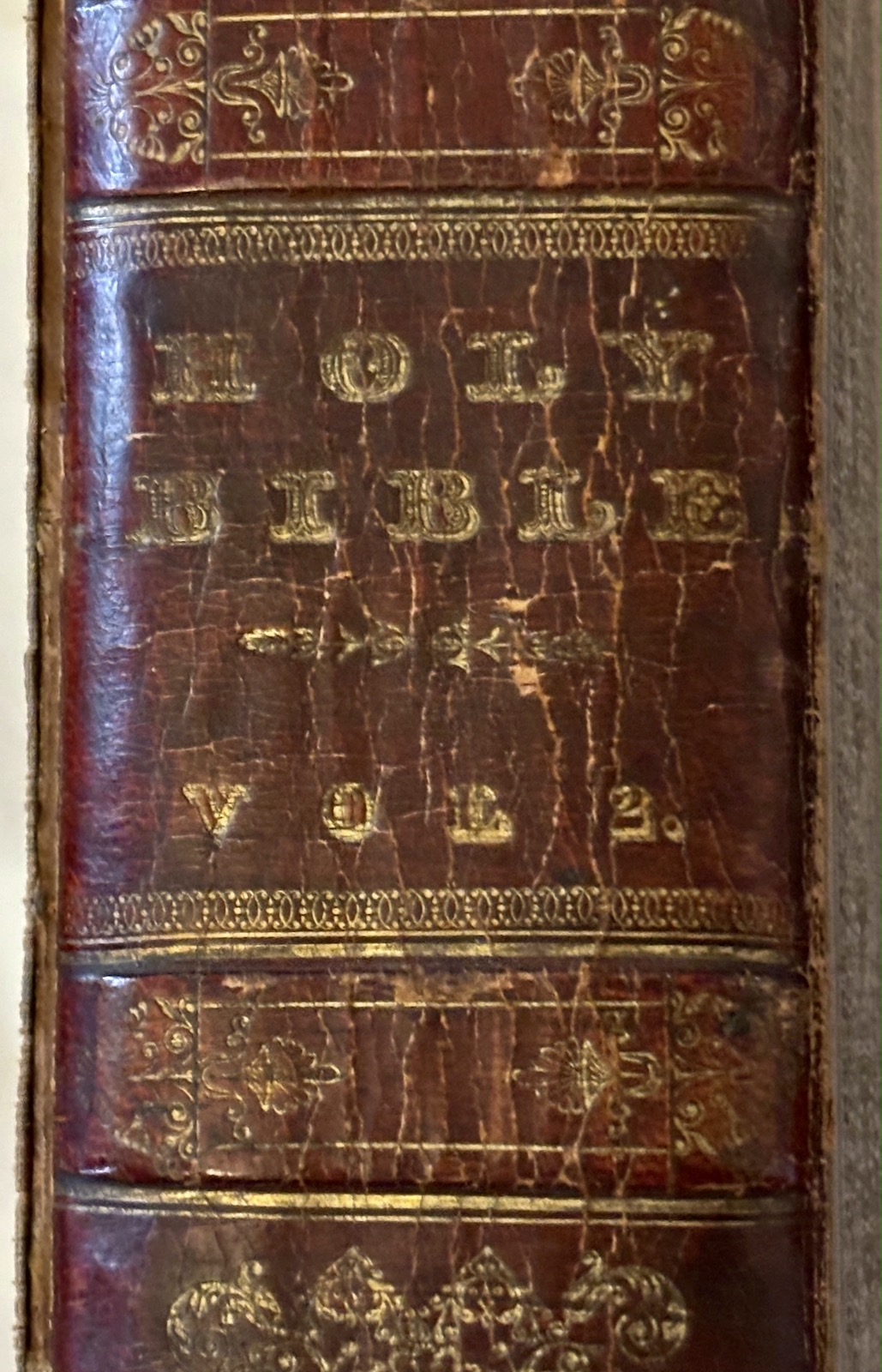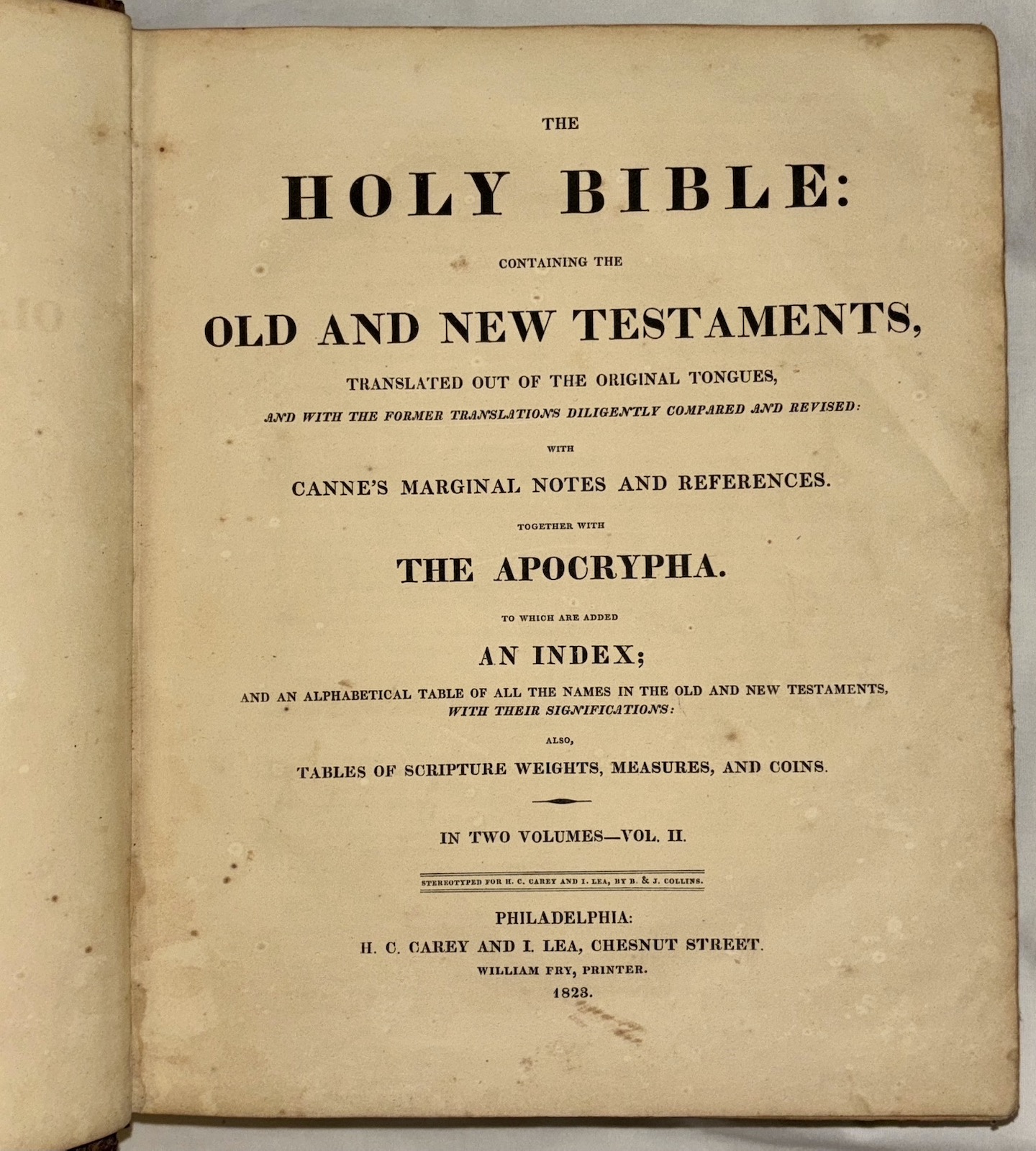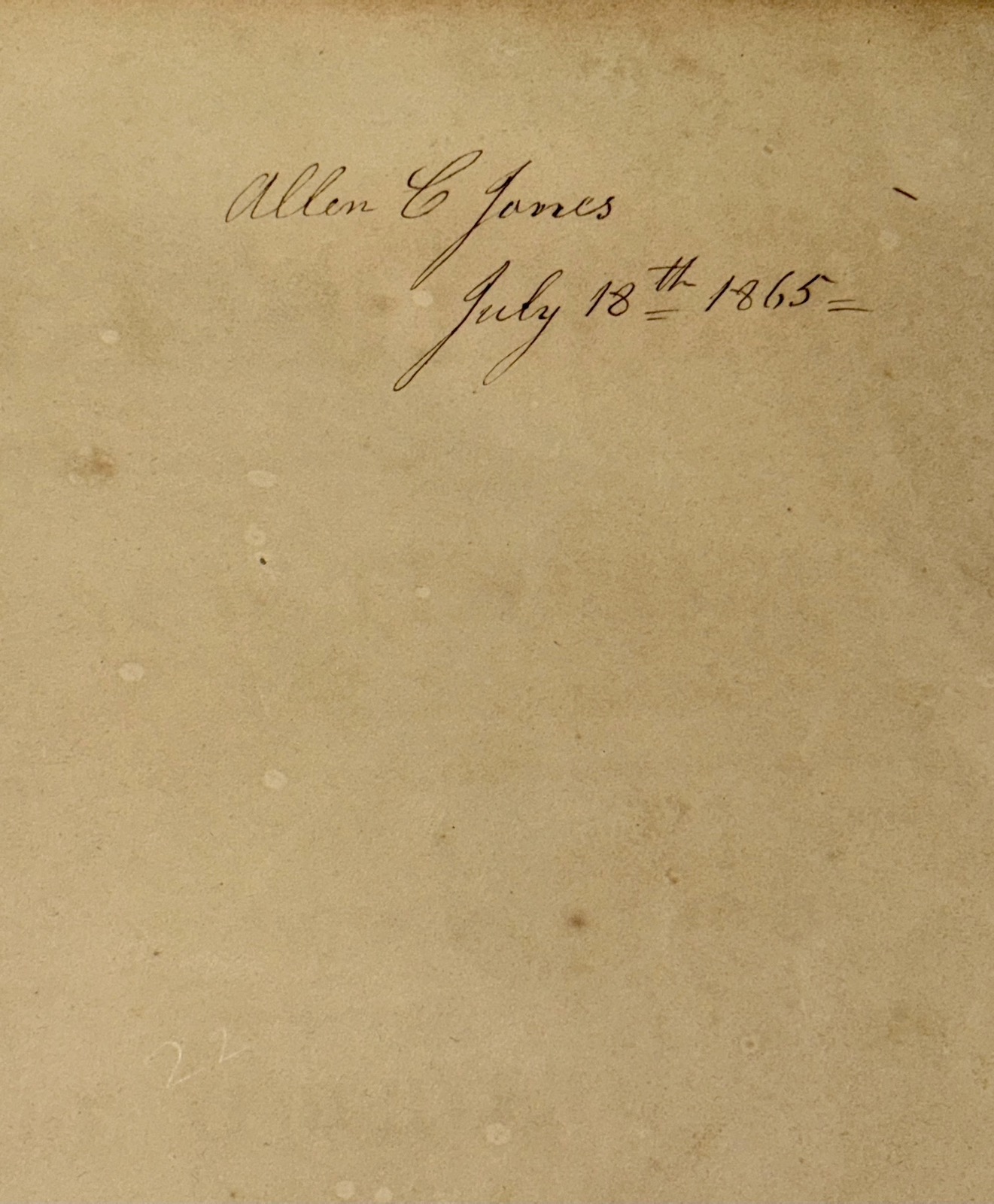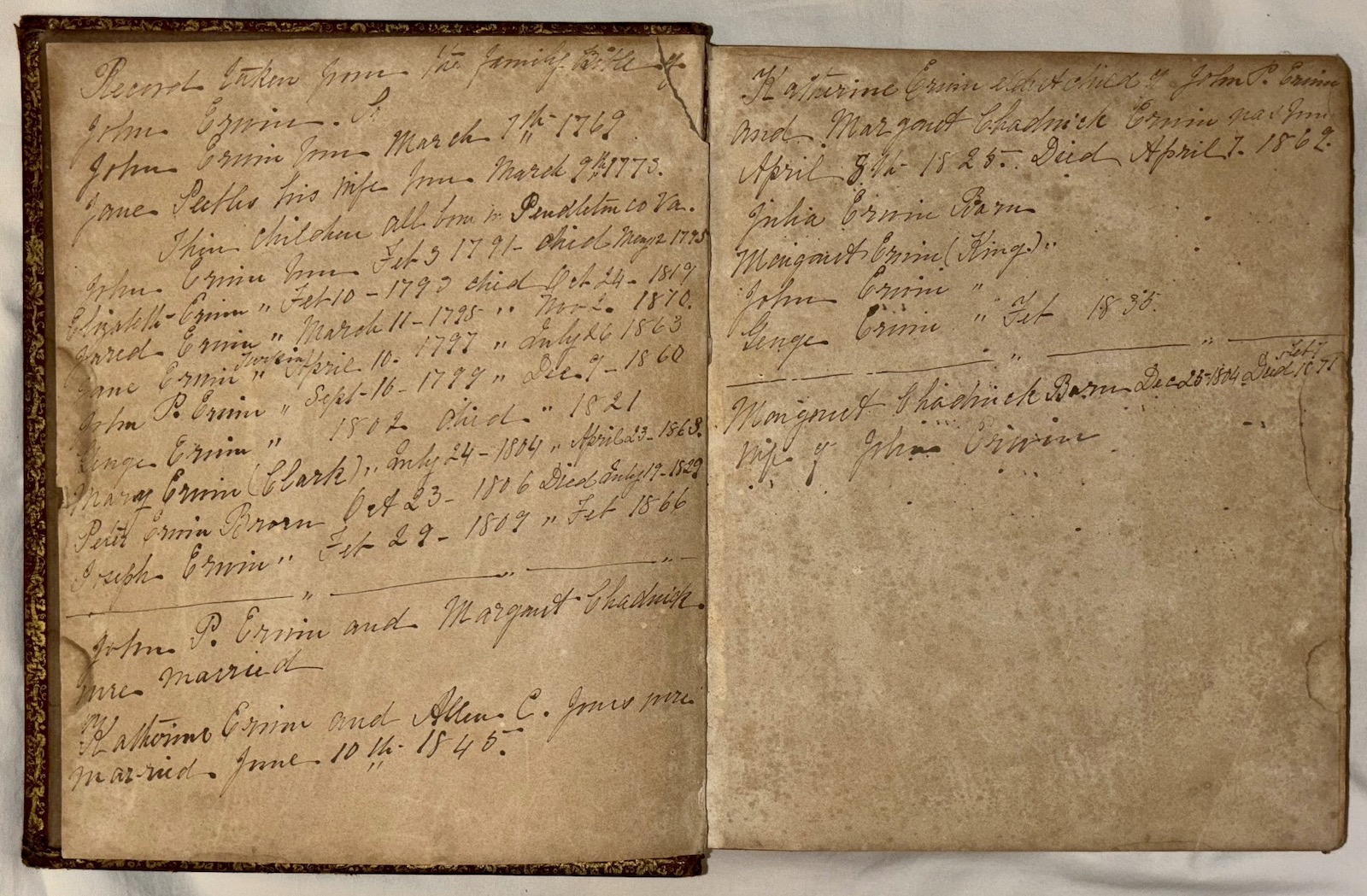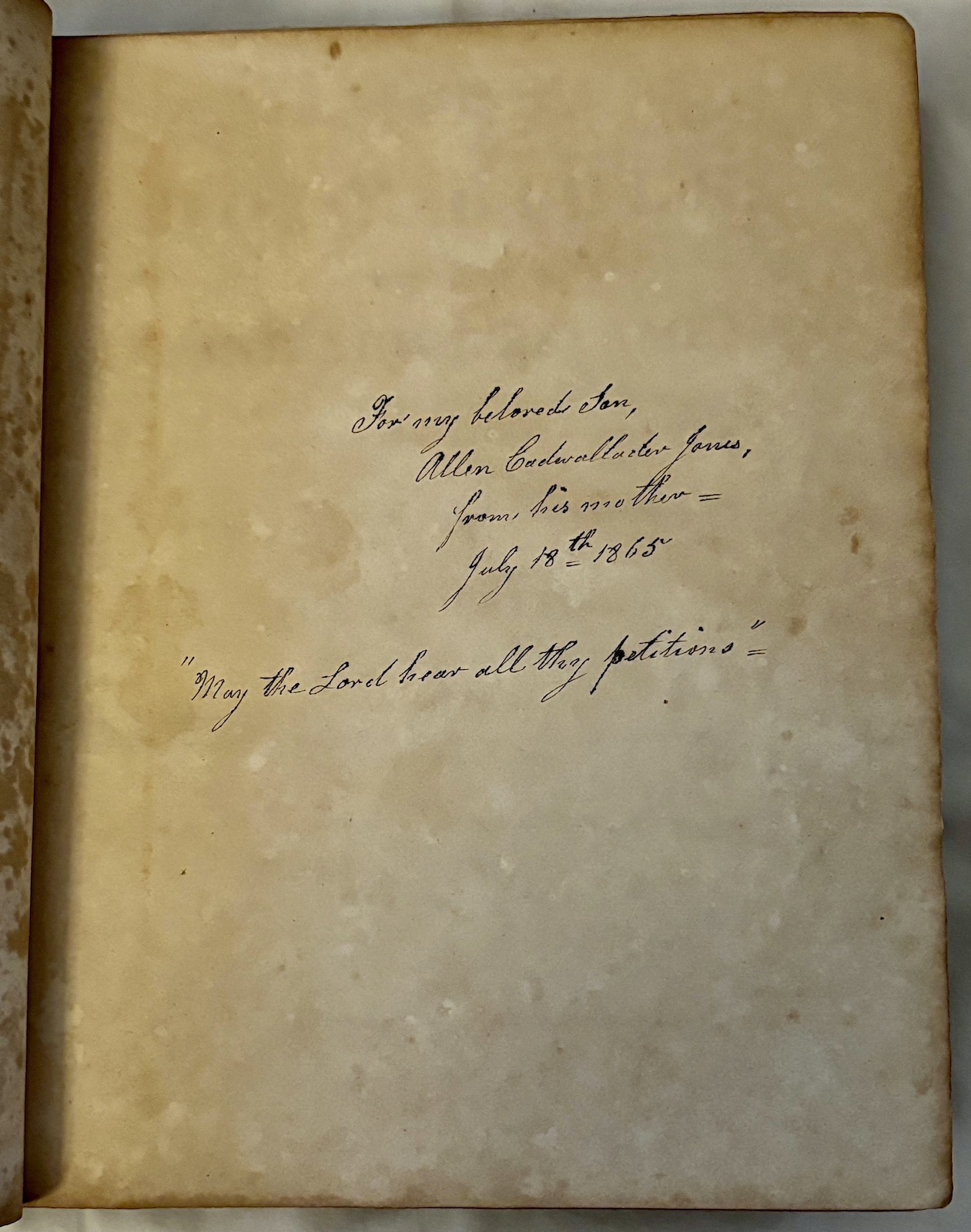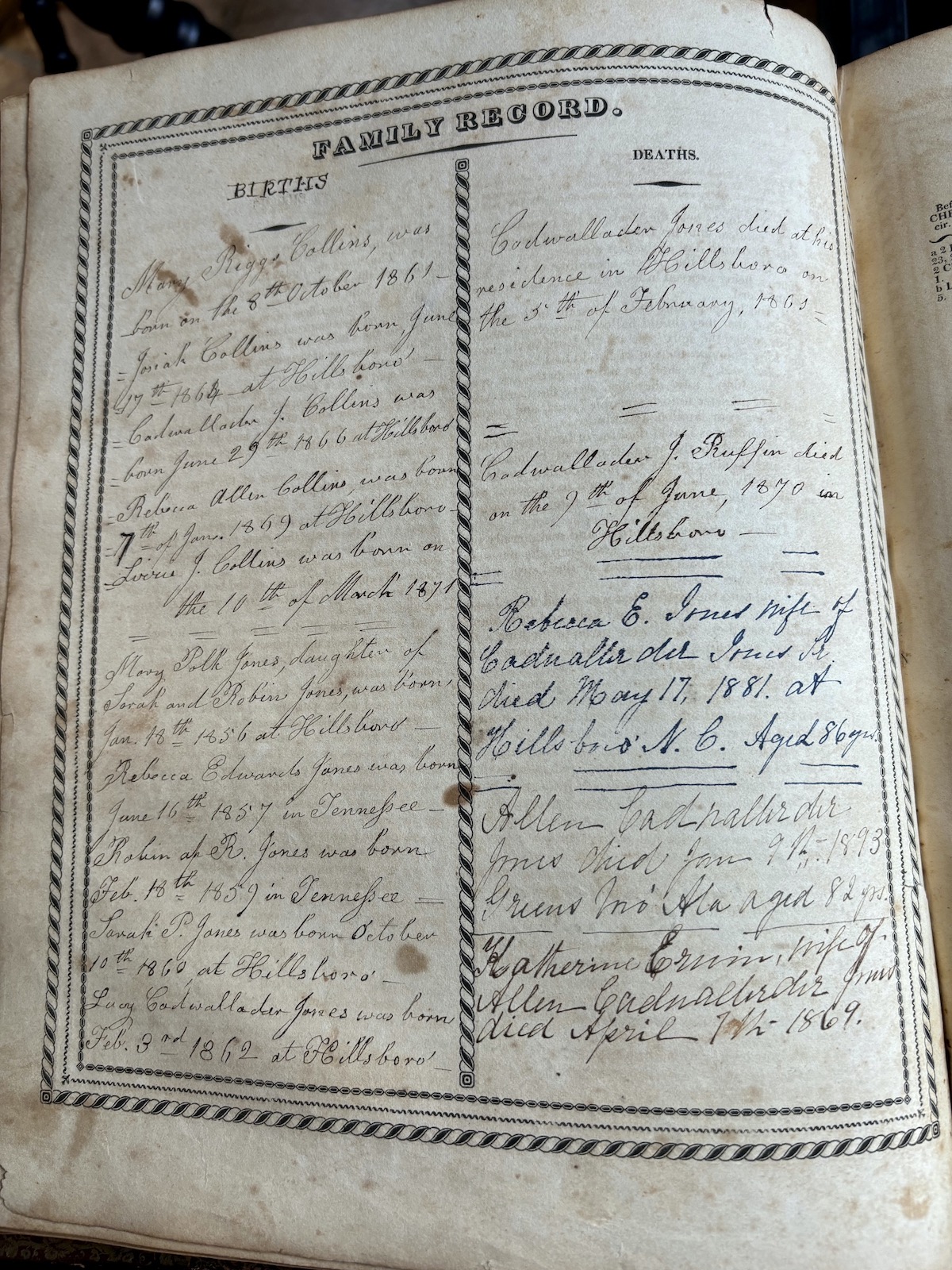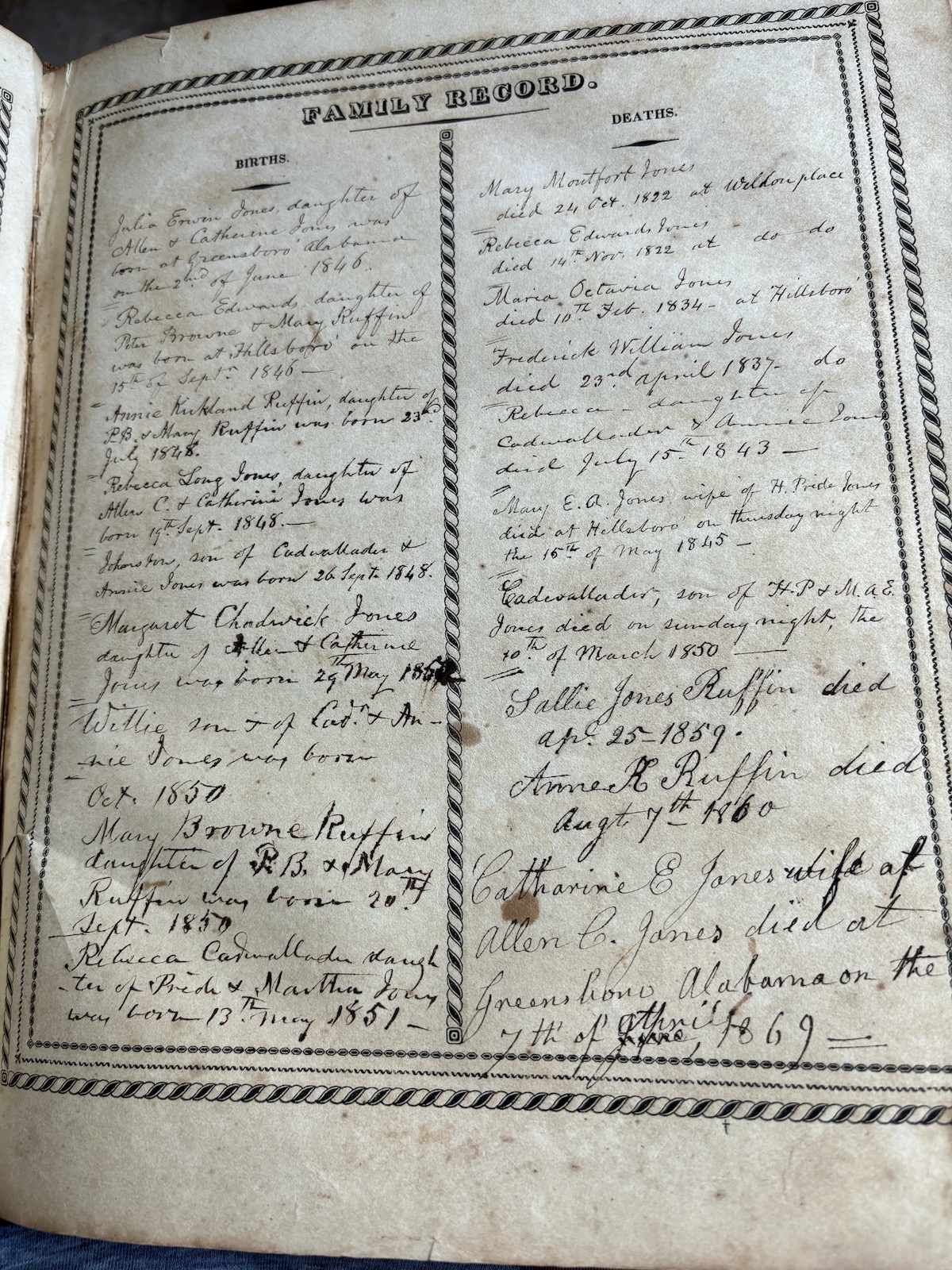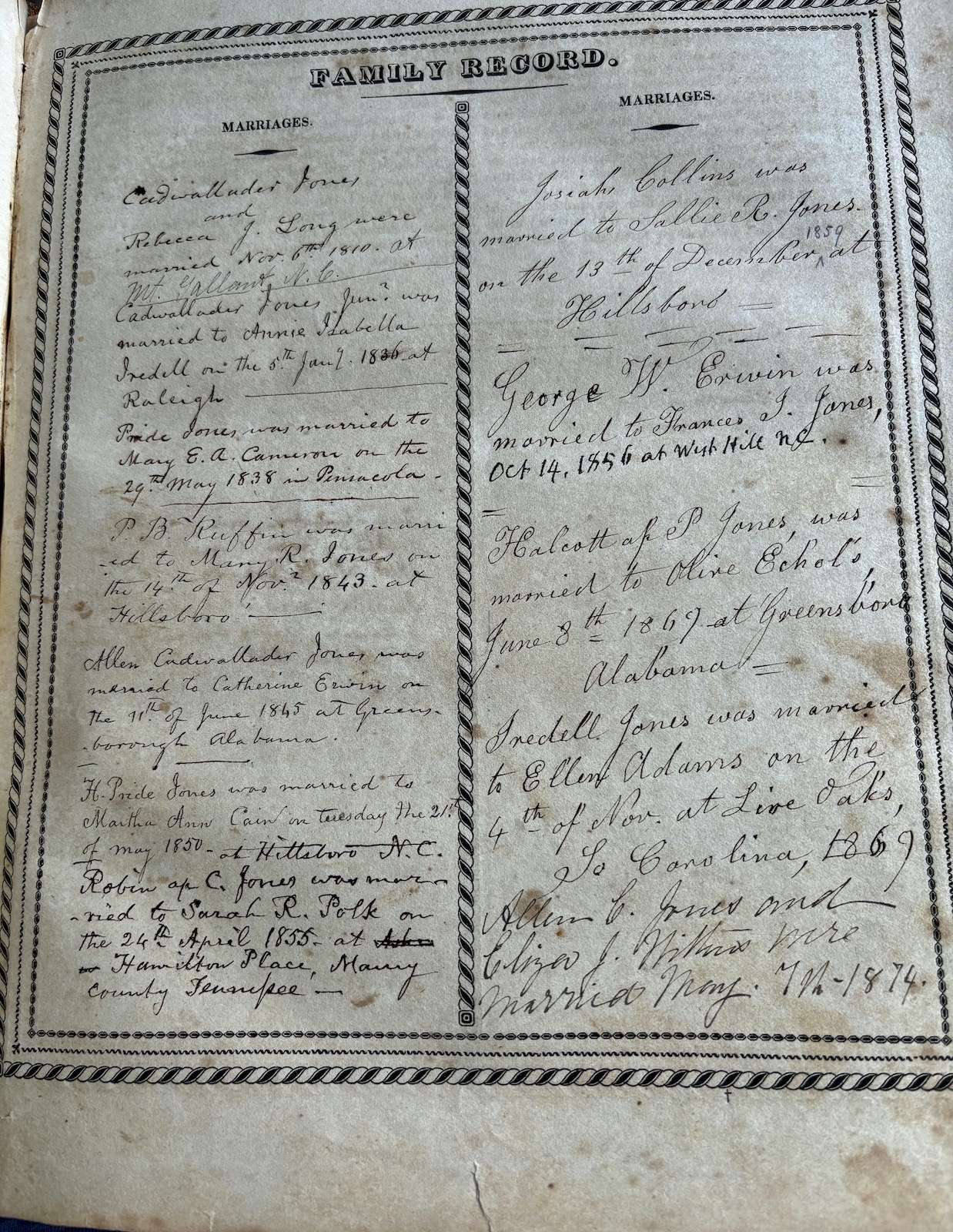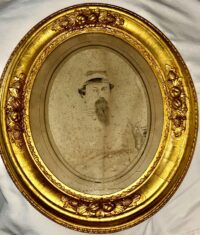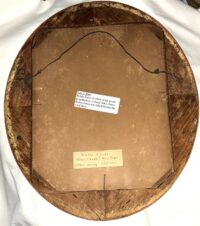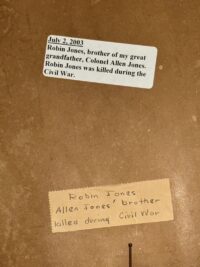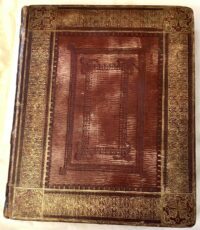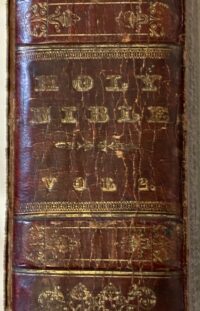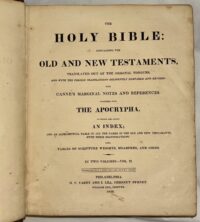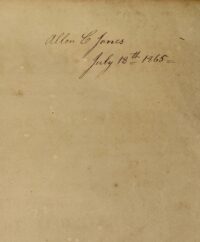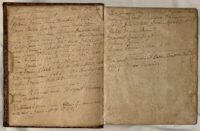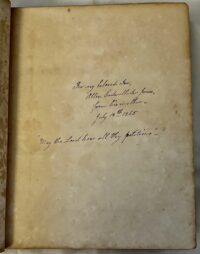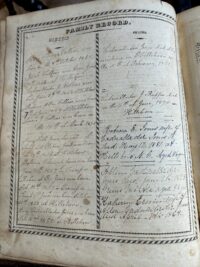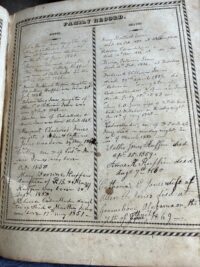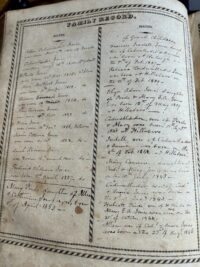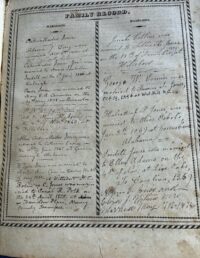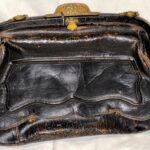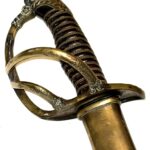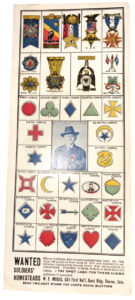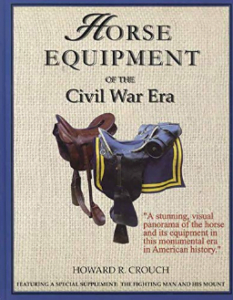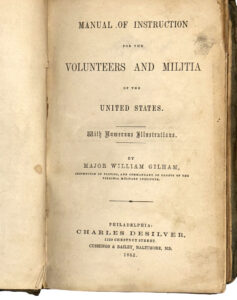Large Format Salt Print of Captain Robin Jones 1st SC Cavalry KIA at Brandy Station
$3,000
Large Format Salt Print of Captain Robin Jones 1st SC Cavalry KIA at Brandy Station – This rare, large salt print of Captain Robin Jones is housed in its original frame, that has two descriptive labels on the wooden back – both identifying the sitter in the image as Robin Jones. One of the labels is typed – it states the following:
“July 2, 2003
Robin Jones, brother of my great
grandfather, Colonel Allen Jones.
Robin Jones was killed during the
Civil War.”
The second label is markedly older and handwritten; it states:
“Robin Jones
Allen Jones’ brother
killed during the Civil War”
Robin Allen Cadwallader Jones was born 1826 in Hillsboro, Orange County, NC, the 5th of 11 known surviving children (5 boys/6 girls) born to wealthy planter Col. Cadwallader Jones II of “Monte Cailoux” Plantation, near Petersburg, VA, and later Hillsboro, NC; and his wife, Rebecca Edwards Long of “Mt. Gallant” Plantation, Northampton Co, NC.
He was descended on both sides of his family tree from some of the most prominent and influential families in Virginia and North Carolina. He was the paternal grandson of Maj. Cadwallader Jones I. and Mary Halcott Pride; and great grandson of Frederick Jones and Mary Elizbeth Epes, all of Virginia. He was a direct descendant of this family’s patriarch, Abram Jones, one of 4 sons of Richard Jones of Wales who came to the Virginia Colonies in the late 1600’s; the Jones family would achieve a position as one of the most prominent families in the Colony, contributing sons from each and every successive generation to military service, in their new country. Robin Jones was the maternal grandson of Maj. Lunsford Long and his first wife, Rebecca Edwards Jones, daughter of Gen. Allen Jones of “Mt. Gallant”, Northampton Co, North Carolina.
On April 25, 1855, Robin Jones married 22-year-old Sarah Rachel Polk of “Hamilton Place” in Maury Co, TN; she was the daughter of Gen. Lucius Junius Polk and Mary Eaton, and great granddaughter of Col. William Polk and Sarah Hawkins of Raleigh. The couple commenced married life in Hillsboro, where their first child was born. By 1857, they had returned to Sarah Jones’ family’s home, in Tennessee where two more children were born. By 1860, the couple had relocated to York County, SC, where Robin had a large and successful plantation near Fort Mill. In all, the couple would become parents to 5 known children.
South Carolina seceded from the Union in January, 1861, and in June, 1862, Robin Jones enlisted as Captain of Company H of the 1st Regiment, South Carolina Cavalry. The regiment had organized in October, 1861, using the 1st South Carolina Cavalry Battalion as its nucleus. The 1st South Carolina Cavalry served in South Carolina, then moved to Virginia and was assigned to General Wade Hampton’s, M.C. Butler’s, W.H. F. Lee’s, and P.M.B. Young’s Brigade. The regiment fought at Chambersburg, Fredericksburg, Brandy Station, Upperville, Gettysburg, Bristoe, Kelly’s Ford, and Mine Run. Ordered south, it served under Colonel G.P. Harrison and later Generals Bonham and Logan. It was prominent in the defense of Savannah and the campaigning of the Carolinas. This unit had 339 effectives at Gettysburg, but only 46 were present in February, 1865. It was included in the surrender of the Army of Tennessee.
Captain Robin A. C. Jones was killed at the Battle of Brandy Station in Culpepper Co, Virginia, on June 9, 1863. The Battle of Brandy Station, also called the Battle of Fleetwood Hill, was the largest predominantly cavalry engagement of the American Civil War, as well as the largest to take place ever on American soil. It was fought at the beginning of the Gettysburg Campaign by the Union cavalry under Maj. Gen. Alfred Pleasanton against Maj. Gen. J.E.B. Stuart’s Confederate cavalry, on June 9, 1863.
Capt. Jones has a monument in St. Matthew’s cemetery near other family members, and it is assumed his body is buried here, although this researcher found no evidence the body was returned to North Carolina following the Battle of Brandy Station.
Following the war, Robin Jones’ 32-year old widow returned to Tennessee to be near her family. Never remarrying, she died in 1905, at the age of 72 and is buried in St. Johns Churchyard in Maury County, Tennessee.
In this rare, Confederate, large size, salt print, Captain Jones is depicted wearing his Confederate Officer’s frock coat and forage cap. The image is housed in its original, faux gilt frame. The photographer’s imprint appears at the bottom of the image:
“H. M. Hall, Photographer, Nashville, Tenn.”
Hall’s studio, during the war, was located in Nashville, at the southwest corner of Cedar and Public Square (Cedar St is now Charlotte Ave].
The image remains in very good condition; as with most period salt prints, there is some fading and foxing, although overall, the image retains good resolution.
Measurements: Frame – H: 14”; W – 11.25”; Image – H: 8.75”; W: 6.5”
Accompanying this image is a two-volume, early Jones family Bible, containing both the Old Testament and New Testament. The Bibles, printed in 1828, in Philadelphia, have an inked presentation appearing in Volume I, on one of the flyleaves; the presentation reads:
“For my beloved Son,
Allen Cadwallader Jones,
from his mother
July 18th1865”
“May the Lord hear all thy petitions”
Inked on another entry, flyleaf is:
“Allen C. Jones
July 18th 1865”
In Volume I, on another flyleaf, are inked family names and important, associated dates. In Volume II, in the middle of the book, are handwritten family names and events, to include marriages, birth and deaths. The Bibles are leather bound, with gilt, decorative tooling. Both are in overall good condition, retaining engraved plates; the front board on Volume I has detached; on Volume II, the back board is detached.
This is an important family grouping, featuring a rare, wartime, salt print of a Confederate officer, killed at Brandy Station.
Robin Jones
| Residence was not listed;
Enlisted on 6/1/1862 as a Captain.
On 6/1/1862 he was commissioned into “H” Co. SC 1st Cavalry (date and method of discharge not given) (Estimated date of enlistment) |
1st SC Cavalry
| Organized: on 6/25/62 Mustered Out: 4/26/65 at Durham Station, NC |
| From | To | Brigade | Division | Corps | Army | Comment |
| Jun ’62 | Aug ’62 | 2nd Military Dist SC | Dept of South Carolina, Georgia and Florida | |||
| Sep ’62 | Sep ’62 | 3rd Military Dist SC | Dept of South Carolina, Georgia and Florida | |||
| Nov ’62 | Sep ’63 | Hampton’s | Cavalry | Army of Northern Virginia | ||
| Sep ’63 | Sep ’63 | W.H.F. Lee’s | F. Lee’s | Cavalry | Army of Northern Virginia | |
| Sep ’63 | Mar ’64 | Butler’s/Young’s | Hampton’s | Cavalry | Army of Northern Virginia | |
| Jul ’64 | Nov ’64 | Ripley’s | Dept of South Carolina, Georgia and Florida | Co. K | ||
| Jul ’64 | Dec ’64 | Taliaferro’s | Dept of South Carolina, Georgia and Florida | |||
| Dec ’64 | Dec ’64 | Harrison’s | Dept of South Carolina, Georgia and Florida | |||
| Jan ’65 | Jan ’65 | Cavalry | McLaws’ | Dept of South Carolina, Georgia and Florida | ||
| Jan ’65 | Jan ’65 | Harrison’s | McLaws’ | Dept of South Carolina, Georgia and Florida | ||
| Apr ’65 | Apr ’65 | Logan’s | Butler’s | Army of Tennessee | Hampton Cav |
1st South Carolina Cavalry Regiment
| 1861 | |
| October 31 | Organized as the 1st South Carolina Cavalry Battalion of six companies under the command of Lieutenant Colonel John L. Black. Assigned to the Department of South Carolina. |
| November-December | The Department of South Carolina was expanded to become the Department of South Carolina and Georgia. |
| December-May | Assigned to the 3rd Military District of South Carolina, Department of South Carolina, Georgia and Florida. |
| 1862 | |
| May-August | Assigned to the 2nd Military District of South Carolina, Department of South Carolina, Georgia and Florida. Three additional companies were added. |
| May 29 | Skirmish at Pocotaglio |
| June 7 | Skirmish at John’s Island |
| June 25 | The battalion was expanded and was redesignated as the 1st South Carolina Cavalry Regiment under the command of Colonel John L. Black, Lieutenant Colonels William A. Walker, and Major Niles Nesbitt.Companies A-F were from the original battalion. Companies G-I were Companies A-D from the 1st South Carolina State Cavalry Battalion. Company A – Abbeville Troop; Major Moses T. Owen Company B – Ferguson Rangers; Captain Niles Nesbit Company C – Edgefield Rangers and Barnwell Rangers; Captain Angus P. Brown Company D – Chester Troop; Captain J.S. Wilson Company E – Fort Motte Rangers; Captain James D. Trezevant Company F – Allen Hussars; Captain A.T. Clayton Company G – Captain L. J. Johnson Company H – Captain Robin Cadwallader Jones Company I – Round O Troop; Captain John R.P. Fox Company K – Captain Angus P. Brown |
| September | Assigned to the 3rd Military District of South Carolina, Department of South Carolina, Georgia and Florida. |
| November-September | Moved to Virginia and assigned to Hampton’s Brigade, Cavalry Division, Army of Northern Virginia. |
| December 12 | Dumfries (detachment) |
| December 13 |
Battle of Fredericksburg |
| December 27-29 |
Raid on Dumfries and Fairfax Station |
| 1863 | |
| June 9 |
Battle of Brandy StationCaptain Robin Cadwallader Jones of Company H was killed. First Lieutenant James H. Barry took over the company and was promoted to captain. |
| July 1-3 |
Battle of GettysburgThe regiment brought 339 men to Gettysburg, |
| July 2 |
Battle of Hunterstown |
| September | Assigned to W.H.F, Lee’s Brigade, F. Lee’s Division, Cavalry Corps, Army of Northern Virginia |
| September-March | Assigned to Butler’s-Young’s Brigade, Hampton’s Division, Cavalry Corps, Army of Northern Virginia |
| October 9-22 |
Bristoe Campaign |
| November-December |
Mine Run Campaign |
| 1864 | |
| May 26 | Chapman’s Fort, Ashepoo River |
| July-December | Attached to Talliaferro’s Brigade, Department of South Carolina, Georgia and Florida Company K |
| December | Attached to Harrison’s’s Brigade, Department of South Carolina, Georgia and Florida |
| 1865 | |
| January | Assigned to Cavalry, McLaws’s Division, Department of South Carolina, Georgia and Florida |
| January | Assigned to Harrison’s Brigade, McLaws’s Division, Hardee’s Corps |
| January-February | Assigned to Elliott’s Brigade, Talliaferro’s Division, Hardee’s Corps Company E assigned to Talliaferro’s Division, Hardee’s Corps Company K assigned to Mercer’s Brigade, Wright’s Division, Hardee’s Corps Detachment assigned to Harrison’s Brigade, McLaws’s Division, Hardee’s Corps |
| February-April |
Carolinas CampaignThe regiment mustered 46 men. |
| April | Assigned to Logan’s Brigade, Butler’s Division, Hampton’s Cavalry Command |
| April 10 | Moccasin Swamp |
| April 26 |
Durham StationSurrendered with Johnston’s army. |
Capt Robin Allen Cadwallader Jones
BIRTH
18 Jan 1826
Hillsborough, Orange County, North Carolina, USA
DEATH
9 Jun 1863 (aged 37)
Brandy Station, Culpeper County, Virginia, USA
BURIAL
Saint Matthews Episcopal Church Cemetery
Hillsborough, Orange County, North Carolina, USA
* Mary Polk Jones (1856-1893)
* Rebecca Edwards Jones (1857)
* Robin A. C. Jones II (1859)
* Sarah Polk Jones (1860)
* Lucy Cadwallader Jones (1862-1941))
South Carolina seceded from the Union in January, 1861, and Robin joined as Captain of Company H of the 1st Regiment, South Carolina Cavalry Regiment organized in October, 1861, using the 1st South Carolina Cavalry Battalion as its nucleus.
The SC 1st served in South Carolina, then moved to Virginia and was assigned to General W. Hampton’s, M.C. Butler’s, W.H. F. Lee’s, and P.M.B. Young’s Brigade. The regiment fought at Chambersburg, Fredericksburg, Brandy Station, Upperville, Gettysburg, Bristoe, Kelly’s Ford, and Mine Run. Ordered south, it served under Colonel G.P. Harrison and later Generals Bonham and Logan. It was prominent in the defense of Savannah and the campaigning of the Carolinas. This unit had 339 effectives at Gettysburg, but only 46 were present in February, 1865. It was included in the surrender of the Army of Tennessee.
Captain Robin A. C. Jones was killed at the Battle of Brandy Station in Culpepper Co, VA on June 9, 1863. The Battle of Brandy Station, also called the Battle of Fleetwood Hill, was the largest predominantly cavalry engagement of the American Civil War, as well as the largest to take place ever on American soil. It was fought at the beginning of the Gettysburg Campaign by the Union cavalry under Maj. Gen. Alfred Pleasonton against Maj. Gen. J.E.B. Stuart’s Confederate cavalry on June 9, 1863.
Capt. Jones has a monument in St. Matthew’s cemetery near other family members, and it is assumed his body is buried here, although this researcher found no evidence the body was returned to NC following the Battle of Brandy Station.
Following the war, his 32-year old widow returned to Tennessee to be near her family. She never remarried, a mourned the loss of her husband until the end of her days. She died in 1905 at the age of 72 and is buried in St. Johns Churchyard in Maury County, TN.
As for his children, it is known his eldest daughter Mary Polk Jones, married Col. Duncan Brown Cooper of Tennessee and died in 1893. She is buried in Zion Presbyterian in Maury Co, TN. Sarah Polk Jones married James C. Bradford of Davidson Co, TN; and Lucy Cadwallader Jones married Stanley Bell Herndon of Hillsboro, NC. His only son and namesake, Robin A. C. Jones, never married.
BATTLE OF BRANDY STATION —
The half-starved men of the Confederate Army of Northern Virginia had streamed into Culpepper County after their victory at Fredericksburg. Under the leadership of General Robert E. Lee, the troops seemed invincible and massed around Culpeper preparing to carry the war north into Pennsylvania. These combat-hardened men had defeated armies twice their size at Fredericksburg and Chancellorsville, but the constant enemies of hunger and poor equipment were showing their effects. Lee was determined to strike north to capture horses, equipment, and food for his men. By June 5, two infantry corps under Longstreet and Ewell were camped in and around Culpeper. Six miles north of town, holding the line of the Rappahannock River, General J.E.B. Stuart bivouacked his cavalry troopers, screening the Confederate Army against surprise by the enemy.Federal officers at their Brandy Station winter camp having dinner
Most of the Southern cavalry was camped near Brandy Station. Stuart, the “dashing cavalier”, requested a full field review of his troops by General Lee. His request granted, on June 8 nearly 9,000 mounted troopers passed Lee’s reviewing stand, first at a walk, then in full gallop as sabers glistened in the sun and 22 batteries of horse artillery roared in simulated battle. Today this review field remains much as it was in 1863, except that the Virginia Police Station occupies part of it.
A dense fog hung over the Rappahannock on the morning of June 9. Unknown to the Confederates, 10,000 Union horsemen had massed their forces on the other side. Misinterpreting the screening action of Stuart’s cavalry, Union General Pleasanton thought he was attacking a rebel raiding party of unknown strength. Pleasanton’s attack plan called for a two-prong thrust at the enemy. One half of his men would cross the river at Beverly’s Ford, two miles below Brandy Station, and the other half would cross at Kelly’s Ford, four miles downstream. Caught in these pincers, the Southern cavalry would be surprised, outnumbered, and beaten. One lone artillery piece was left atop Fleetwood Hill, and only a token force to guard Stuart’s headquarters. As this single gun fired the few shells available, the Union horsemen halted their advance. Racing against time, Confederate cavalry rushed back from the St. James battle line to meet this new threat.
Never before had the Union cavalry shown such strength and skill in combat. Stuart’s headquarters was overrun, and the rear lines at St. James were threatened. Help arrived as Gen. W.H.F. (Rooney) Lee’s cavalry rode in from Little Fork Church (seven miles from Brandy) and saved the day for Stuart. After 12 hours of raging battle, Union troops retreated to the north side of the river. Some 19,000 mounted men were engaged in this, the greatest cavalry battle ever to take place in the western hemisphere. For the first time in the Civil War, Union cavalry matched the Confederate horsemen in skill and determination.
Family Members
Parents
Col Cadwallader Jones Jr
Rebecca Edwards Long Jones
Spouse
Sarah Rachel Polk Jones
Siblings
Col Allen Cadwallader Jones
COL Cadwallader Jones III
Dr Halcott Pride Jones Sr
Mary Rebecca Jones Ruffin
Maria Octavia Jones
Sarah Rebecca Jones Collins
Frederick William Jones
Children
Mary Polk Jones Cooper
Rebecca Edwards Jones
Sarah Polk Jones Bradford
Lucy Cadwallader Jones Herndon

